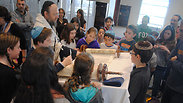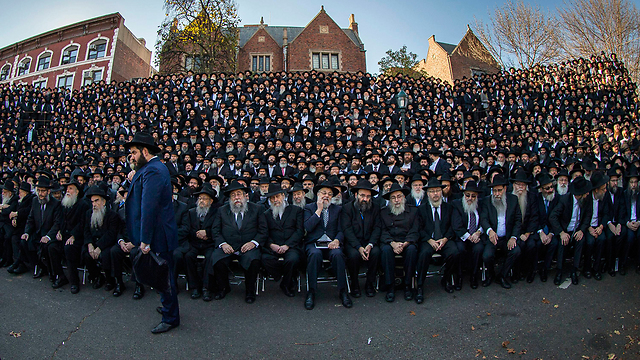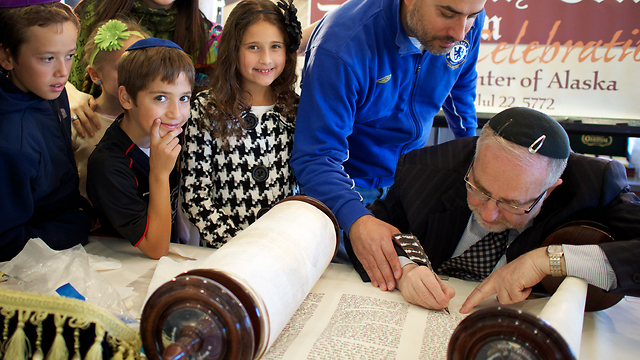
We'll keep marketing the Jewish faith
Op-ed: What's good for salty snacks is good for mezuzahs and tefillin; both need to be marketed, and this is the basis for the actions of Chabad activists.
Those who can't adapt to our changing reality may not be able to keep up. Imagine a business that won't announce its products—one that doesn't advertise special deals. "Those who want it will find us themselves," the company's vice president of marketing says, while shifting a bead in his abacus and drinking some of the water he just pumped from the well outside.
In contrast, those who can sell, market, convince, and gather support will see the returns. And our children? Those whose education we worry about so much, and won't let anyone talk to? They may be the biggest victims of this brainwashing, if the SpongeBob conditioner, Frozen shampoo, and Smurfs soap in my bathroom are any indication.
This may surprise you, but religious practices need marketing too. For some reason, there are those who believe—wrongly—that Judaism is part of that old passive world that says otherwise. Mezuzahs and tefillin can and should be marketed via the same methods used to sell Bamba (a highly popular peanut butter-based Israeli salty snack) to the public.
This is the basis for the actions of Chabadnikim (adherents to Chabad, a chassidic sect —ed.), who stand on the street and offer men who pass by the chance to put on tefillin and offer women who pass by a pair of Shabbat candles. You can see them in many places across Israel: the entrances to medical centers, central bus stations, shopping centers, and other densely populated areas. There's no compulsion here, mind you. Just an offer. Those who want to take what's offered can, those who don't—too bad, but we wish you a good day.
Those who wish to can go on their way, but there are enough Jews who are happy and grateful for the opportunity. They didn't appoint you to be their speakers, so don't speak in their name. I, for example, receive an email from this or that company advertising some digital content service. One click is enough for me to see that I'm not interested. The junk mail can be deleted, and there are no hard feelings.
You need to take a good look in the mirror and admit that the current educational reality in Israel shouldn't leave us especially surprised to learn that many people don't have tefillin, don't know what the words "Shema Yisrael" truly mean, and have not been given education or guidance regarding these ancient and important traditions. And it's not like people are lining up to change this. The only option is to go out and offer people the chance to learn and experience, and thank God for the 336 branches of Chabad youth in Israel, who do this in charming fashion.
There's nothing illegal here, and no attempt to convert anyone either. What you see here is a simple offer to someone walking by—to perform a religious practice in which they haven't yet had the opportunity to take part. That's no more of a threat than a petition booth opposing testing on animals or one marketing the services of a new cellular provider.
I spent last week signing copies of my new book at the Book Week fair in Tel Aviv's Rabin Square. The number of people of all kinds—religious, Meretz activists, LGBT people, old, young, college students—who conversed with me was amazing. More than a few were very honest, saying they were buying the book since it was the first time they've met an ultra-Orthodox person, and I made them curious. With this in mind, wouldn't it have been a pity had I not published it?
And what, you may ask, is the Chabadnikim's gain from all of this?
There is actually something gained. But here's where the resemblance to other marketers ends: They only do what they do for their own benefit, but Chabad does it for your benefit. Because it really cares about you. Its people care about you having a Passover seder even if you're in Kathmandu, and a kindergarten for your child in Orlando, and a way to connect to your Judaism in Tel Aviv. Chabad simple believes that connecting with Judaism will be good for you and for the entire people of Israel. And that's a huge gain for all.
A few years ago, someone who worked for a television program called me and asked for my response to the following: It turned out that there was a school in central Israel that would invite a Chabad representative to speak to the students about Jewish tradition ahead of major holidays. So that the distinguished rabbi would not feel too comfortable, he was forced to wait outside, until his five minutes came and he was allowed to enter.
"That is a outrage," I told her.
"Really?" she said enthusiastically, "And would you be willing to come admit this in our studio? I'll send a taxi right over."













